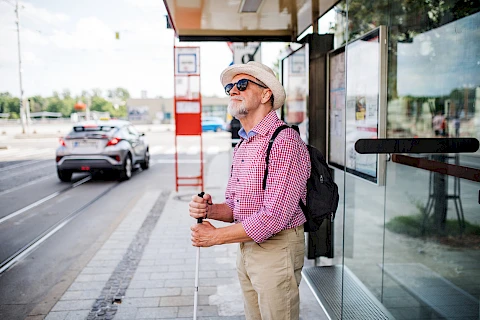
Traveling with vision loss can bring unique challenges, but it also offers rewarding experiences and unforgettable memories. With thoughtful planning and preparation, seniors with vision loss can enjoy smooth and enjoyable travels. Whether visiting local spots or exploring new countries, here are some tips to prepare well for your journey.
Pre-Trip Planning
Traveling with vision loss requires pre-trip planning. Before you embark on your travels, gather as much information as possible about your destination. Start by researching the places you want to visit and checking if they have accessible accommodations. Booking accessible accommodations and transportation well in advance can save you a lot of trouble later. Inform airlines, hotels, and tour operators about your vision loss and any specific needs you may have.
Packing Essentials
Packing can feel challenging, but having the right items can make a big difference.
- Don't forget your must-have items like a white cane or magnifying glass.
- Bring large-print materials or electronic devices that support text-to-speech.
- Organize your luggage so that items are easy to find.
- Label your belongings with tactile markers or braille labels for quick identification.
Remember that a well-packed bag can make navigating your destination much easier.
Navigating Airports and Stations
Airports and stations can be overwhelming when traveling with vision loss, but there's plenty of help available. Requesting assistance from transportation staff can significantly ease your travel experience. Many airports offer wheelchair assistance and guide services to help you move smoothly through the terminal. Navigating security checks and boarding processes is simpler with a helping hand, so don't hesitate to ask for assistance early.
Traveling With a Companion
Having a travel companion can make the journey more enjoyable and less stressful. The benefits include having someone to help navigate and manage your luggage, and simply sharing the experience. Discussing your needs and preferences with your companion can ensure that both of you have a smooth and enjoyable journey.
Using Mobility Aids
Mobility aids like white canes and guide dogs can be incredibly effective, especially when traveling with vision loss. Training and practice are essential when using an aid, especially in new environments. Practicing in a familiar setting can help build your confidence. For safety, you need to be particularly cautious when using aids in crowded or unfamiliar places. You want to remain aware of your surroundings to avoid potential hazards.
Local Transportation Tips
Getting around in a new place can be tricky. Utilizing local public transportation systems can be a good option. Many cities offer services tailored to individuals with disabilities, so inquire about these in advance. Don't hesitate to request assistance from bus and train staff if needed. When it comes to ride-sharing services and taxis, letting the driver know about your vision loss can ensure a smoother ride.
Exploring New Places
Exploring new environments can be one of the most rewarding parts of traveling with vision loss. Familiarize yourself with the new surroundings by walking around your area soon after arriving. Technology can be a huge help here. Use apps and other gadgets designed for navigation to aid your travels. Joining guided tours and group activities can also give you an extra layer of support and enjoyment.
Senior Helpers Can Assist You During Your Travels
Traveling with vision loss requires extra planning, but it is entirely possible and can be immensely rewarding. From packing the right items to using mobility aids and local transportation, following these tips can make your journey smoother and more enjoyable.
For personalized assistance and support, contact us at Senior Helpers Greenwood & South Indianapolis. We serve Indianapolis, Greenwood, Columbus, Franklin, and Marion County, and we're here to help make your travel dreams a reality.